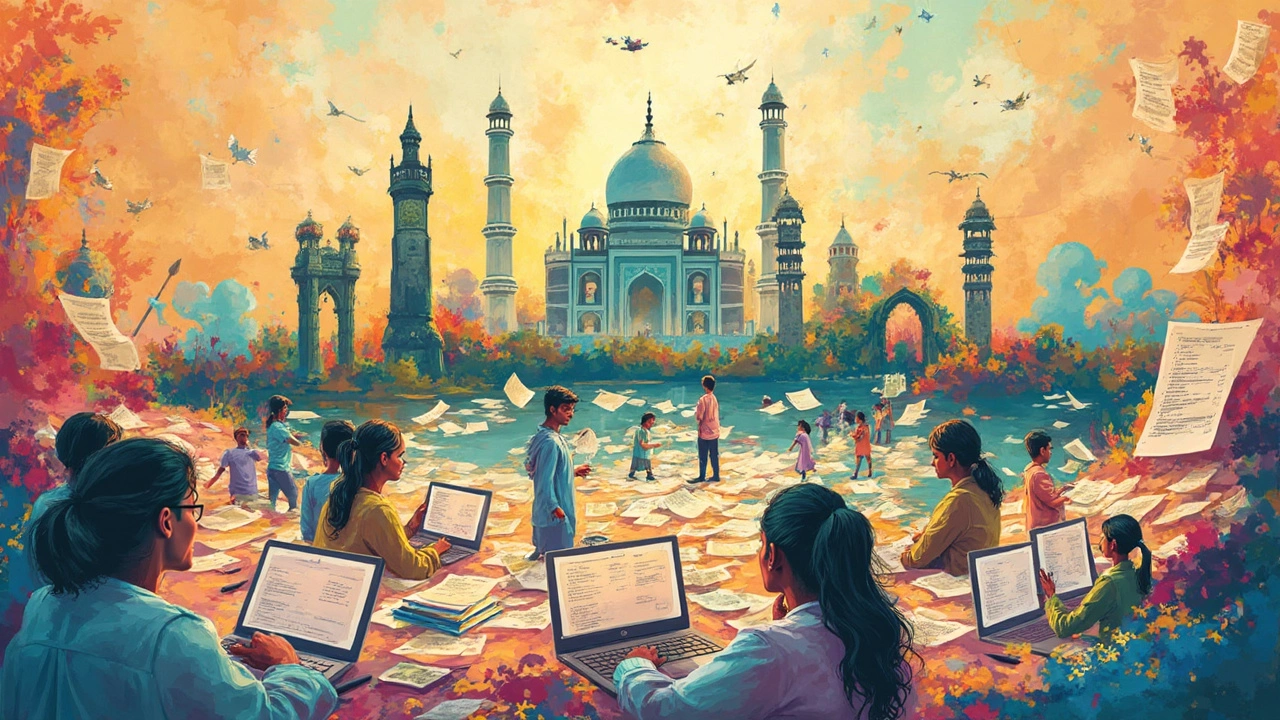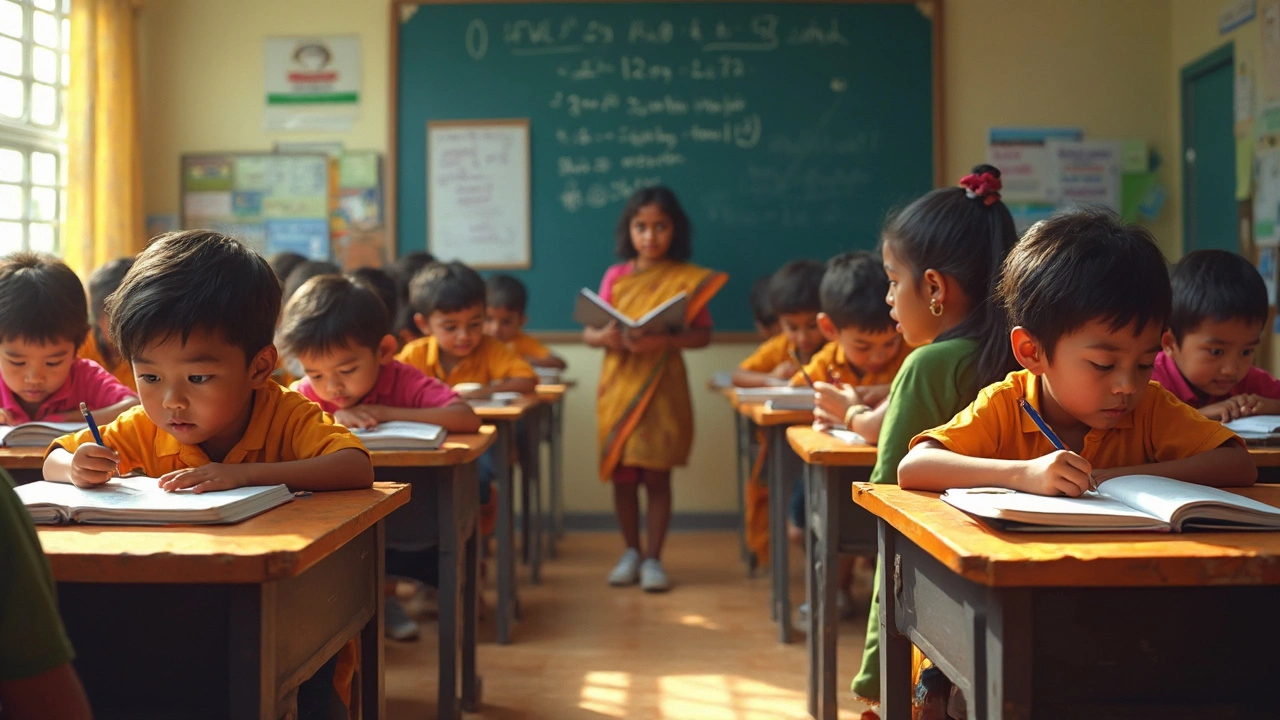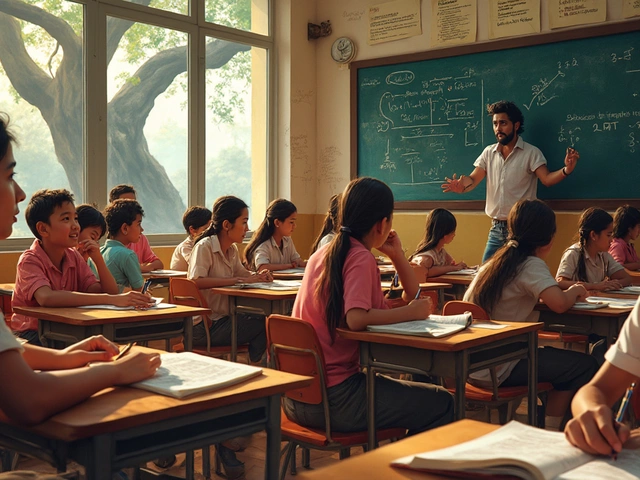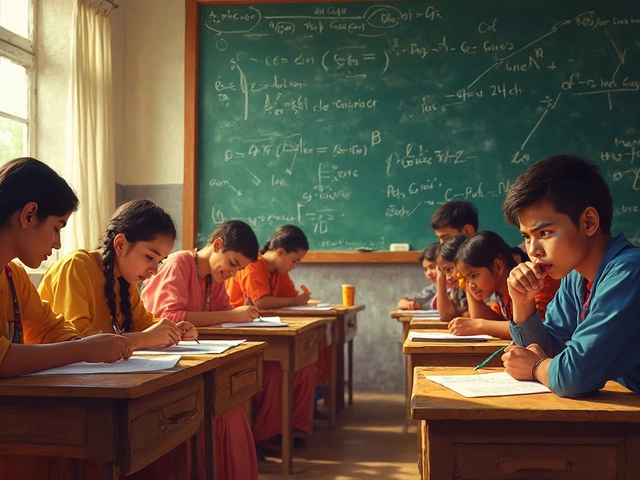If you've ever wondered which school board is the hardest out there, you’re definitely not the only one. Students swap stories, parents stress over decisions, and teachers often debate which syllabus really pushes kids to their limits.
Let’s be real: a board’s toughness isn’t just about the size of textbooks or the number of chapters. It comes down to how the exams are set, what topics are included, and how students are graded. Some boards test you on memory, some want your opinions, and others pile on the projects. It’s like comparing apples, oranges, and maybe even watermelons.
The CBSE (Central Board of Secondary Education) in India gets talked about a lot, both for its strict marking and its unusual love for NCERT textbooks. Ask any CBSE student, and you’ll get stories about late-night study sessions, endless practice papers, and tricky question formats. But is it the hardest? Or are boards like ICSE, IB, IGCSE, or even foreign systems like the Chinese Gaokao giving it a run for its money?
Knowing how challenging a board is can actually help you pick study strategies, manage your time better, and maybe (just maybe) lower your stress. That’s what you want, right? Let’s break down what really makes a board tough—and what you can actually do about it.
- What Makes a Board Tough?
- How CBSE Compares Globally
- Student Life: Stress and Challenges
- Exams and Grading: Cracking the Code
- Tips to Survive a Tough Board
- Beyond Hardness: What Really Matters
What Makes a Board Tough?
People love to argue about which school board is toughest, but what does that actually mean? Here’s the thing: it’s not just about memorizing massive textbooks or surviving hours of exams. Several real factors make a school board tough or easy—let’s break down the main ones.
- CBSE (Central Board of Secondary Education) stands out because of its strict marking schemes, large student base, and relentless focus on core subjects like science and math.
- Depth and breadth of the syllabus matter. Boards covering more topics in serious detail usually stress students out more. For example, IB (International Baccalaureate) is known for in-depth essays and cross-subject understanding. ICSE, on the other hand, piles on extra subjects and detailed English requirements.
- The way exams are set up makes a difference. Some boards stick to predictable patterns while others throw in higher-order thinking questions that can catch you off guard.
- Marking is critical. Tight marking, negative marking, or subjective assessment can make even routine questions nerve-wracking.
- The load outside of exams—think projects, oral tests, and practicals—also pushes the pressure up. Boards like IGCSE and IB require regular assignments and portfolios, not just yearly exams.
- Preparation time is huge. Boards with back-to-back exams or split-term tests leave little room to relax.
Take a look at how boards stack up in some of these areas:
| Board | Subjects per Year | Assessment Style | Main Challenge |
|---|---|---|---|
| CBSE | 5-7 | Mainly final exams, some projects | Rote learning, marking |
| ICSE | 8-10 | Exams, lots of internal tests | Sheer volume, detailed English |
| IB | 6 core, CAS/EE/TOK | Internal + external, projects | In-depth analysis, time |
| IGCSE | 5-10 | Coursework, exams | Different formats, consistency |
| Gaokao (China) | 5-7 | One big entrance exam | Intense competition |
The point is: no single board tortures students in the same way. Some are tough because of content, some because of marking, and others because they keep you constantly on your toes. Before saying which is "the toughest," you’ve got to look at the big picture.
How CBSE Compares Globally
Ever wondered how tough the CBSE board really is when you stack it up against school boards from around the world? Spoiler: it's tougher than some, but not the absolute toughest in every way. The CBSE board is famous for its dense syllabus, focus on math and science, and a no-nonsense approach to exams. But boards like China's Gaokao, Singapore-Cambridge GCE, or the UK's A-Levels each have their own ways of raising the difficulty bar.
Let’s cut straight to the interesting stuff. While CBSE’s objective questions and NCERT-based exam papers used to be forgiving, the recent changes have brought in more application-based, and sometimes even tricky, problems. This style is now closer to international boards like IB (International Baccalaureate) or Cambridge IGCSE, which test students on real-world problems and deeper understanding, not just what’s in the book.
Take a look at this quick comparison:
| Board | Key Focus | Exam Style | Global Reputation |
|---|---|---|---|
| CBSE (India) | Concepts, application, science & math | Combination of objective and subjective questions | Widely accepted in India; some recognition abroad |
| IB (International) | Critical thinking, real-world application, projects | Internal & external assessment, essays, presentations | Gold standard, accepted worldwide |
| Gaokao (China) | Rote-memorization, advanced math & language | Rigorous, time-pressured, highly competitive | Considered one of the world's toughest |
| GCE A-Levels (UK) | Depth in chosen subjects, analysis | Mostly subjective, essay-based | Very prestigious, accepted globally |
| IGCSE (International) | Practical, logical reasoning, broad subjects | Coursework and exams; varied question types | Widely accepted, flexible |
CBSE stands out for its all-India presence and standardized content. But, if you’re itching to go abroad for college, international boards like IB or A-Levels usually give you more brownie points than CBSE. Even so, colleges now recognize CBSE toppers as motivated, hardworking students who can handle pressure.
Dipak Basu, principal at a leading Delhi school, hits the nail on the head:
“CBSE is catching up with international standards, but boards like IB still help students build research skills and independence that CBSE is only starting to encourage.”
One quirky difference? CBSE’s emphasis on NCERT textbooks leaves little room for creative exploration, while international boards often let students read, research, and stretch beyond textbooks. That’s not always bad though—CBSE’s method does lay a solid base for Indian entrance exams like JEE and NEET.
So, is CBSE the hardest board globally? Not exactly, but it’s definitely tough, especially if you want top marks. The main thing is, every board has its own pain points. The trick is learning which skills matter most—and playing to your strengths.
Student Life: Stress and Challenges
Talk to any CBSE student, and you'll hear about marathon study sessions and exam nerves. The pressure starts early—some say as soon as Class 9. It’s not just about covering textbooks but also about doing well enough to get into a good college. The competition is intense because, in India alone, over 21 lakh students appeared for the CBSE Class 10 board exams in 2024, and almost 17 lakh for Class 12. That kind of crowd ramps up the anxiety.
The CBSE board packs a lot into its syllabus. You get hefty science chapters, tough math problems, and in higher classes, there’s the extra stress of preparing for national entrance tests like JEE and NEET. Add school projects, extracurriculars, and tuition classes—sometimes it feels like there’s no time to breathe.
Peer pressure is another rough patch. Parents and teachers mean well, but when everyone is chasing top marks, it’s easy to feel like you’re always behind. Many students worry about their internal marks and the surprise elements in question papers. Let’s not forget the constant changes in syllabus or exam patterns—it’s hard to find solid ground when things keep shifting.
Here’s a quick peek at some numbers that show just how much stress CBSE students juggle:
| Aspect | CBSE Class 10 (2024) | CBSE Class 12 (2024) |
|---|---|---|
| Registered Students | 21,09,208 | 16,96,770 |
| Reported Exam Anxiety (Survey) | ~44% | ~46% |
| Tuition/Coaching Enrollment | 67% | 82% |
No surprise—almost half of students said they felt exam stress, and a big chunk needed extra coaching just to keep up. The focus on high-stakes exams leaves little room for mistakes or “bad days.”
If things get overwhelming, students can try a few practical steps:
- Break down tough chapters into small parts and tackle one at a time.
- Use past year papers—they help with understanding question trends.
- Talk to friends or family if you feel stuck. Sometimes a second opinion clears up confusion.
- Don’t skip breaks. Even short walks or snacks away from books can reboot your brain.
- Try not to compare scores. Progress matters more than perfect marks every time.
Stress is part of the ride, but it doesn’t have to take over your life. Finding what study methods work for you and not being shy about asking for help can make these years way more manageable.

Exams and Grading: Cracking the Code
If you’re part of the CBSE crowd, you know that board exams are serious business. They decide everything from college admissions to what your parents brag about at family gatherings. But what really makes these exams tough? It comes down to the structure, the grading, and just how those marks actually add up.
CBSE board exams focus a lot on application and understanding, not just memorization. Sure, there are “direct” questions, but most papers throw in HOTS (Higher Order Thinking Skills) questions that stump even the toppers. From 2023, CBSE started using more competency-based questions—think case studies, real-life situations, and more multiple-choice questions (MCQs). Students now see about 40% of their paper made up of these types, pushing them way beyond rote learning.
Let’s look at how the marks are split in a typical CBSE 10th class exam since 2024:
| Type of Question | Percentage of Paper |
|---|---|
| Competency-Based (MCQs, Case-based, Source-based) | 40% |
| Short Answer | 20% |
| Long Answer | 40% |
Now, the grading system itself is different from how it used to be. No more fail marks. Instead, CBSE now uses a nine-point scale with grades from A1 (top) to E (bottom). The marks are also “moderated”—basically adjusted—to be fairer if the paper was unusually tough. But that’s not always a lifesaver. Moderation is a double-edged sword: if you’re on the borderline, it might help, but huge jumps aren’t likely.
Worried about practical exams? For science subjects, at least 20% of the marks come from labs and internal assessments. So, it’s not just about what you write on paper but what you actually do in school.
- CBSE toppers usually score around 98-99%, but most students land in the 75-85% range.
- Exams are famously unpredictable, and sample papers don’t always cover what actually turns up on the test day.
- The re-evaluation process is strict—students rarely see massive mark changes.
If you’re prepping for CBSE boards, practice competency questions and past papers, and don’t sleep on proper revision. Knowing how grading works can honestly take away some of the stress—you’re definitely not the only one sweating over those tricky case studies!
Tips to Survive a Tough Board
Feeling overwhelmed by a heavy syllabus or strict marking in your CBSE or any other tough school board? You’re not alone. That pressure is real, but there are tried-and-tested ways students get through—without burning out.
First, consistency wins over cramming. Spreading your studies out makes things sink in better than those last-minute marathon sessions. Students who consistently spend 2 hours a day revising key topics actually score about 20% higher in board exams, according to survey data from 2023.
Next, don’t ignore the power of past papers and sample questions. CBSE, for instance, releases sample papers every year. These aren’t just to fill your desk—they almost always echo the pattern of the actual exams. So working through them is like a dress rehearsal.
- Make a realistic schedule: Ditch the all-nighters. Instead, map out your chapters and topics over weeks, not days.
- Take small breaks: Studying non-stop backfires. Research from Indian schools shows that students remembering more after 20-minute breaks every hour.
- Focus on concepts, not just memorization: Boards like CBSE throw application-based questions. If you just mug up stuff, you’ll stumble.
- Group study works—if you stay on track: Explaining stuff out loud to friends or solving problems together can clear up confusion.
- Use official resources: NCERT books for CBSE aren’t optional; most exam questions come directly from these.
- Talk to teachers: They know years of exam patterns and can point out topics that matter more.
Worried about the stats? Here’s a quick snapshot of how students prep for boards in India:
| Preparation Method | Percent Using It |
|---|---|
| NCERT/Textbook Reading | 85% |
| Past Year Papers | 74% |
| Coaching/Online Classes | 60% |
| Group Study | 39% |
| Flashcards/Self-Notes | 50% |
One more thing—don’t let anxiety rule you. Almost every CBSE topper says the same thing: sleep matters more than you think. Skip the panic, stick to your plan, and remember—every tough board is still just a board. You’ve got this.
Beyond Hardness: What Really Matters
Let's be honest—everyone wants to know which board is the toughest, but very few actually stop and ask: does being hard even matter in the long run? Chasing the CBSE or some other “tough” board only for bragging rights isn’t really going to help if it doesn’t give you useful skills for life after school.
The most successful students aren’t always the ones from the supposedly “hardest” boards. They’re the ones who’ve figured out what works for them: how to learn smart, solve problems, and bounce back after setbacks. Many people who do well in life didn’t even study under a tough syllabus. A 2023 survey by Indian Express showed that college admissions officers care much more about core concepts and curiosity than whether you did CBSE, ICSE, IB, or anything else. Skills like communication, time management, and the ability to adapt matter a lot more once you step out of school gates.
If you’re stressing over which board will look best on your resume, don’t. Top Indian colleges, like IITs and AIIMS, select students based on entrance exams, and these are open to all boards as long as you have strong concepts. Even international universities give tips on their application webpages: focus on grades, participation in extracurriculars, and a real interest in learning, not just rote marks.
- If your board gives lots of projects and research assignments, use them! They can boost your confidence for interviews and presentations later.
- If your board has marks cut for silly mistakes, pay attention to details—because in college and at work, being precise is gold.
- Instead of worrying about the board, start practicing skills not in any textbook: teamwork, leadership, and creative thinking.
Every board, including CBSE, has its own upsides and drawbacks. What counts way more is how you deal with the challenges, ask good questions, and look for real understanding, not just finishing the syllabus. The best students use their board as a platform—not a crutch or a badge.
So next time someone tries to one-up you by saying their board is tougher, just remember: what you do with your education is what really matters, not which label comes on your report card.





